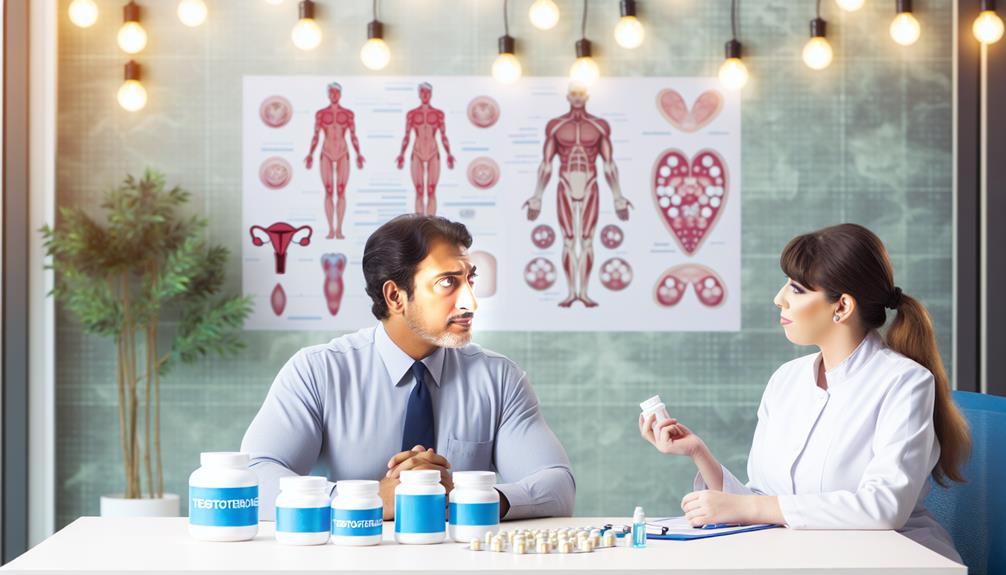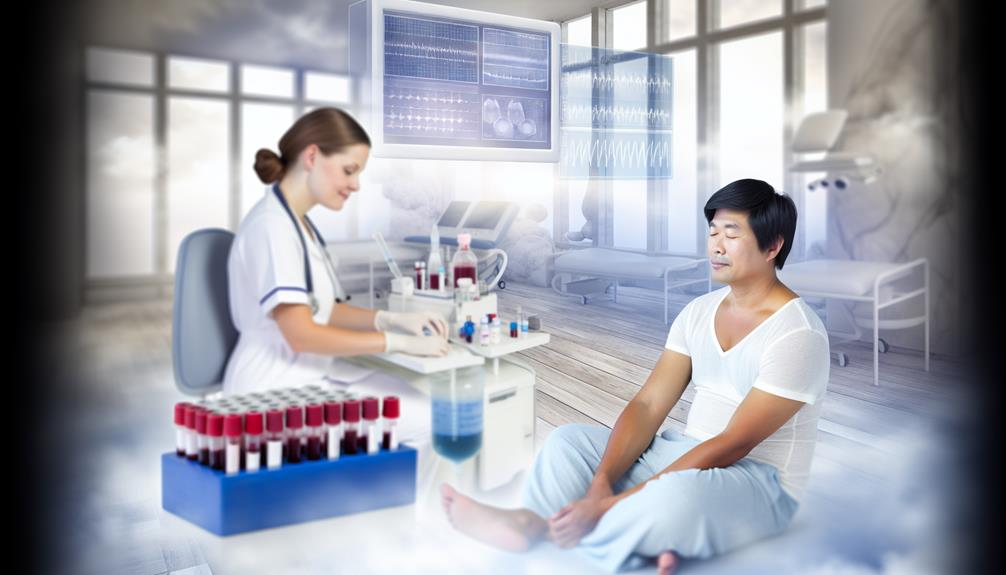If you're exploring hormone therapy options as a man, testosterone replacement therapy (TRT) is often considered the best approach. In my experience, treatments like injections, gels, and pellets can effectively restore testosterone levels. Each method has its pros and cons; for instance, gels provide easy application, while injections are fast-acting. I've seen clients report benefits such as improved energy, mood stabilization, and increased muscle mass. However, it's essential to consult healthcare professionals to safely monitor hormone levels and manage side effects. There's a lot more to uncover about optimizing your hormonal health, so let's explore further.
Understanding Hormone Imbalance

Hormone imbalance can affect many aspects of a man's health, often presenting with a range of symptoms that can be subtle or pronounced. Understanding the role of hormones is essential, as they are important for regulating critical hormone functions in the body. The endocrine system, which consists of glands like the pituitary, thyroid, and adrenal glands, produces and releases hormones that influence everything from metabolism to mood.
When there's an imbalance, it can disrupt these significant functions. For instance, testosterone plays a key role in muscle mass, energy levels, and sexual health. If testosterone levels become too low or too high, it can lead to various health issues. Similarly, imbalances in other hormones like cortisol or insulin can result in weight gain, fatigue, and even depression.
I've learned that hormone imbalances can stem from several factors, including aging, stress, poor diet, and underlying health conditions. Monitoring hormone levels through blood tests is essential for identifying imbalances. Once we pinpoint the issue, we can explore appropriate interventions, whether lifestyle changes, medication, or hormone replacement therapy.
Recognizing that the endocrine system is interconnected is significant. Imbalances in one hormone can affect others, leading to a cascade of health problems. As a result, a thorough understanding of hormone functions and the endocrine system as a whole is necessary for effectively addressing any imbalance. By staying informed, we can take proactive steps towards maintaining ideal health.
Symptoms of Low Testosterone
How can you tell if low testosterone is affecting your health? If you're experiencing symptoms like fatigue, reduced muscle mass, or decreased libido, it might be time to contemplate the possibility of testosterone deficiency. Hormonal fluctuations can greatly impact various bodily functions, leading to noticeable changes in your overall well-being.
One of the most common signs I've noticed is persistent fatigue. It's not just about feeling tired; it's a lack of energy that doesn't seem to improve with rest. Alongside this, many men report a decline in muscle strength and an increase in body fat, which can be frustrating. Additionally, low testosterone often manifests as reduced libido. If you've found yourself less interested in sexual activity, it could be a telltale sign of hormonal imbalance.
Mood changes are another critical aspect to reflect upon. Many men with low testosterone experience irritability, anxiety, or even depression. It's essential to recognize that these emotional symptoms can be just as impactful as physical ones. Finally, if you notice difficulties with concentration or memory, these cognitive changes may also be linked to testosterone deficiency.
Testosterone Replacement Therapy

When considering Testosterone Replacement Therapy (TRT), I find it essential to understand its benefits, such as improved energy levels and enhanced mood. Additionally, there are various administration methods available, including injections, patches, and gels, each with its own set of advantages. Let's explore how these options can effectively address symptoms of low testosterone.
Benefits of Testosterone Therapy
Testosterone therapy's benefits can be substantial for men experiencing low hormone levels. I've seen firsthand how it can transform not just physical health but overall well-being. Here's a quick overview of some key benefits:
| Benefit | Description |
|---|---|
| Libido Improvement | Enhances sexual drive and attraction |
| Muscle Gain | Promotes lean muscle mass development |
| Mood Elevation | Reduces feelings of depression and anxiety |
| Energy Boost | Increases stamina and reduces fatigue |
| Cognitive Enhancement | Improves focus and memory |
| Metabolic Health | Aids in fat loss and muscle preservation |
| Sexual Function | Enhances erectile function and satisfaction |
| Sleep Quality | Promotes deeper, restorative sleep |
| Bone Density | Increases bone strength and reduces fracture risk |
| Cardiovascular Health | Supports better heart health and circulation |
Administration Methods Explained
For men considering testosterone replacement therapy, understanding the various administration methods is vital for making an informed decision. Each method has its benefits and drawbacks, influencing hormone absorption and overall effectiveness.
One popular method is transdermal delivery, which involves applying testosterone via patches or gels directly to the skin. This approach allows for a steady release of the hormone into the bloodstream, promoting stable blood levels. It's generally well-tolerated, but it's important to apply the product correctly to guarantee ideal hormone absorption.
Another option is intramuscular injections, typically administered every one to two weeks. While this method can provide a significant testosterone boost, it may lead to fluctuating hormone levels, which some men find undesirable.
Additionally, there are subcutaneous injections, which can be performed at home. They offer more flexibility and can lead to more stable levels compared to intramuscular injections.
Lastly, there are oral formulations, but they have a higher risk of liver toxicity and are less commonly recommended. In choosing a method, consider your lifestyle, comfort with administration, and any potential side effects.
Types of Testosterone Treatments
When considering testosterone treatments, I find it essential to understand the various options available. These include injections and pellets, gels and creams, as well as oral testosterone. Each method has its own advantages and considerations, which can markedly impact treatment effectiveness and personal preference.
Injections and Pellets
In the domain of hormone therapy, injections and pellets stand out as two prominent options for delivering testosterone. I've found both methods effective, but they cater to different preferences and lifestyles.
Testosterone injections require regular administration, typically ranging from once a week to once every two weeks. This injection frequency can vary based on individual needs and the specific formulation used. On the other hand, testosterone pellets offer a more long-term solution, with a pellet duration of around three to six months.
Here's a quick comparison:
| Method | Injection Frequency | Pellet Duration |
|---|---|---|
| Injections | Weekly to bi-weekly | N/A |
| Pellets | N/A | 3 to 6 months |
| Convenience | Requires regular visits | Minimal maintenance |
Choosing between these methods often comes down to personal preference. If you prefer the convenience of less frequent dosing, pellets might be the way to go. However, if you're comfortable with regular injections, they can provide a more immediate adjustment to your testosterone levels. Understanding these options is essential for making an informed decision about your hormone therapy.
Gels and Creams
Several options exist when it comes to testosterone gels and creams, which are popular alternatives for hormone therapy. These topical treatments provide a convenient way to administer testosterone, allowing for a non-invasive approach to hormone replacement. One of the key benefits of gels is their ability for effective gel absorption through the skin, which can lead to stable testosterone levels.
When using gels, it's important to apply them to clean, dry skin, typically on the shoulders or upper arms. Proper application can greatly enhance gel absorption. It's vital to avoid areas where skin might be moist, as this could impact how well the testosterone is absorbed.
Creams, on the other hand, offer flexibility in application. With cream application, you can choose various body areas, which may be beneficial for those who prefer not to use a pump or tube. However, care must be taken to guarantee that the cream is allowed to dry completely before dressing to prevent transfer to others.
Oral Testosterone Options
Although many men prefer topical options, oral testosterone treatments are also available and can offer a practical alternative for hormone replacement therapy. If you're evaluating this option, it's important to weigh both the advantages and disadvantages.
Here are three key points to reflect on:
- Convenience: Oral testosterone is easy to administer. You simply take a pill, making it a straightforward choice for those who dislike injections or gels.
- Absorption: Some formulations provide consistent absorption rates, which can lead to stable testosterone levels throughout the day.
- Reduced Skin Reactions: Oral options eliminate the risk of skin irritation that can sometimes occur with topical treatments.
However, there are also oral testosterone disadvantages to keep in mind. For instance, oral testosterone may lead to liver stress over time, and some forms can cause fluctuations in hormone levels. Additionally, they might not be suitable for men with certain health conditions.
Benefits of Hormone Therapy

Hormone therapy offers numerous benefits for men experiencing hormonal imbalances, particularly as they age. One of the most significant hormone therapy benefits is the restoration of testosterone levels, which can lead to improved energy and vigor. Many men report feeling more invigorated and less fatigued after beginning treatment, which positively impacts their daily activities and overall motivation.
Additionally, hormone therapy can enhance mood stability. Low testosterone levels are often linked to symptoms of depression and irritability. By addressing these hormonal deficiencies, I've noticed a marked improvement in my emotional well-being, making it easier to handle stress and engage more fully with family and friends.
Another critical area where hormone therapy shines is in the domain of physical health. It can contribute to increased muscle mass and strength while reducing body fat. This not only helps in achieving a more toned physique but also promotes better metabolic health. Many men find that they're able to engage in physical activities they once enjoyed, ultimately leading to an improved quality of life.
Furthermore, hormone therapy may support better cognitive function, enhancing memory and mental clarity. This is particularly essential as we age, as maintaining cognitive health becomes increasingly important.
Risks and Side Effects
When reflecting on hormone therapy, it's essential to be aware of the potential risks and side effects that can accompany treatment. While the benefits may be appealing, it's vital not to overlook the possible complications that could arise. Here are three key risks to keep in mind:
- Cardiovascular Issues: Hormone therapy can elevate the risk of heart problems, including heart attacks and strokes, particularly in patients with pre-existing conditions.
- Hormonal Imbalance: Adjusting hormone levels may lead to fluctuations that can result in unintended health consequences, such as gynecomastia or changes in libido.
- Psychological Impacts: Changes in hormone levels can influence mood and mental health, potentially leading to anxiety, depression, or irritability.
It's important to reflect on the long-term effects of hormone therapy as well. Prolonged treatment may have cumulative impacts on your body, which could lead to complications that aren't immediately apparent. For instance, elevated estrogen levels can increase the likelihood of developing certain cancers, adding another layer of complexity to the decision-making process.
Before starting any hormone therapy, I highly recommend discussing all potential risks and side effects with a qualified healthcare provider. They can help you weigh the benefits against the risks and tailor a treatment plan that aligns with your specific health needs. Remember, informed decisions are key to achieving the best possible outcomes in your health journey.
Natural Supplements and Alternatives

Exploring natural supplements and alternatives can be an appealing option for men considering hormone therapy. I've found that incorporating specific herbal remedies and dietary supplements can assist in achieving hormonal balance. Adaptogenic herbs, such as ashwagandha and rhodiola, have shown promise in reducing stress and improving overall well-being. Stress management plays a key role in maintaining ideal hormone levels, and these herbs can help mitigate the effects of stress on the body.
Moreover, ensuring adequate vitamin D and zinc supplementation is essential. Research indicates that vitamin D plays an important role in the production of natural testosterone, while zinc is crucial for testosterone synthesis and metabolism. A deficiency in either of these nutrients can negatively impact hormone levels, so it's worth considering a thorough approach to supplementation.
Additionally, I've discovered that improving sleep quality can greatly affect hormonal health. Poor sleep can lead to imbalances in cortisol and testosterone levels, so prioritizing restful sleep is necessary. While lifestyle modifications might be discussed in the next section, focusing on stress management techniques—such as mindfulness and proper sleep hygiene—can create a solid foundation for hormonal health.
Lifestyle Changes for Hormonal Health
Achieving hormonal balance isn't solely about supplements; lifestyle changes play a significant role as well. I've found that implementing specific adjustments can greatly enhance hormonal health. Here are three key areas to focus on:
- Sleep Quality: Prioritizing restorative sleep is essential. Aim for 7-9 hours per night, as poor sleep can disrupt hormone production, particularly cortisol and testosterone.
- Stress Management: Chronic stress can wreak havoc on hormonal balance. Incorporating mindfulness practices, such as meditation or yoga, helps lower stress levels, allowing your body to function at its best.
- Weight Management: Maintaining a healthy weight is important for hormonal regulation. Excess body fat can lead to imbalances, particularly with insulin and estrogen levels.
Additionally, I'd emphasize the importance of staying hydrated. Proper hydration levels support overall health, including hormone function. Social connections should not be overlooked either; engaging with friends and family can bolster mental health, which in turn supports hormonal balance. Finally, achieving a work-life balance is crucial. When you manage your work stress, you create more room for healthy routines and activities that nurture your well-being.
Incorporating these lifestyle changes might take some effort, but I assure you, the benefits to your hormonal health will be worth it. Embrace these practices to foster a more balanced and fulfilling life.
The Role of Diet

Diet plays a vital role in maintaining hormonal balance, as the foods we consume directly influence hormone production and regulation. I've found that paying attention to dietary fats is essential; healthy fats support testosterone levels and overall hormone synthesis. Additionally, nutrient timing can optimize hormone responses—eating protein-rich meals post-workout can enhance recovery and muscle synthesis.
My food choices greatly impact my hormonal health. I prioritize meal frequency to avoid energy dips, which can disrupt hormonal equilibrium. Incorporating a variety of protein sources, such as lean meats, legumes, and plant-based diets, guarantees I get essential amino acids without exacerbating micronutrient deficiencies.
Maintaining carbohydrate balance is equally important; complex carbs provide sustained energy while preventing spikes in insulin levels. I try to include plenty of fruits and vegetables for their antioxidant intake, which combats oxidative stress and supports overall hormonal function.
Hydration importance can't be overstated, as even mild dehydration can impair hormone production and regulation. I make it a point to drink water consistently throughout the day.
Lastly, I pay attention to my overall dietary pattern, avoiding processed foods that can lead to inflammatory responses and hormonal imbalances. By implementing these strategies in my diet, I feel more in control of my hormonal health and overall well-being. Remember, the right dietary approach can make a considerable difference in how your body manages hormones.
Importance of Exercise
In my experience, regular exercise plays an important role in boosting testosterone levels naturally. It not only enhances mood and energy but also supports overall health, making it an essential component of any hormone therapy plan. Let's explore how incorporating physical activity can greatly impact your well-being.
Boosting Testosterone Naturally
While many factors can influence testosterone levels, engaging in regular exercise stands out as one of the most effective natural methods for boosting this essential hormone. I've found that combining different types of workouts can optimize results. Here are three key strategies:
- Strength Training: Lifting weights can greatly increase testosterone levels. Aim for compound movements like squats and deadlifts.
- High-Intensity Interval Training (HIIT): Short bursts of intense exercise followed by rest periods can elevate testosterone levels more effectively than steady-state cardio.
- Consistency: Regular workouts help manage weight and improve overall health, both of which support hormone balance.
Beyond exercise, I've learned that supporting testosterone levels requires a holistic approach. Prioritizing sleep quality, managing stress through mindfulness practices, and ensuring proper hydration strategies are crucial. Nutritional support like zinc supplementation, vitamin D, and healthy fats can further enhance my efforts.
Enhancing Mood and Energy
Exercise plays an indispensable role in enhancing mood and energy levels, and I've personally experienced its profound effects. Regular physical activity not only helps in boosting testosterone but also contributes considerably to mood stability. I've found that engaging in exercise releases endorphins, the body's natural mood lifters, which can create a sense of well-being and vitality.
To illustrate the impact of exercise on mood and energy, here's a simple breakdown:
| Type of Exercise | Effect on Mood and Energy Levels |
|---|---|
| Aerobic Exercise | Increases endorphin production, leading to improved mood stability. |
| Strength Training | Enhances self-esteem and physical strength, boosting overall energy levels. |
| Flexibility Training | Reduces stress and anxiety, promoting a more relaxed state of mind. |
| High-Intensity Interval Training (HIIT) | Provides quick energy bursts, leading to enhanced alertness. |
Supporting Overall Health
Maintaining overall health is essential, and incorporating regular physical activity is a fundamental aspect of this endeavor. Exercise not only supports physical performance but also enhances holistic wellness, playing a critical role in various areas of life. Here are three key benefits of regular exercise:
- Mental Clarity: Engaging in physical activity improves cognitive function, allowing for better focus and decision-making.
- Stress Management: Exercise releases endorphins, which help alleviate stress and improve emotional health, positively affecting relationship dynamics.
- Sleep Quality: Regular activity promotes better sleep patterns, which is crucial for recovery and overall wellbeing.
Monitoring Hormone Levels

Monitoring hormone levels is vital for anyone undergoing hormone therapy, as it helps confirm that treatment is effective and tailored to individual needs. I've found that regular hormone testing is significant for evaluating how well the therapy is working and whether adjustments are necessary. This process involves measuring key hormones like testosterone and estrogen to verify they're within the desired range.
One of the key aspects of monitoring is tracking fluctuations in hormone levels over time. Hormones can vary due to numerous factors, such as lifestyle changes, stress, or the time of day. By consistently tracking these fluctuations, I can identify patterns that may indicate the need for dosage adjustments or a change in therapy.
Typically, I schedule hormone testing at regular intervals, often starting with a baseline measurement before initiating treatment. Subsequent tests usually occur every few months, or as recommended by my healthcare provider. This proactive approach allows me to stay informed about my hormonal status and make educated decisions regarding my therapy.
In addition to blood tests, I also pay attention to how I feel physically and emotionally. Changes in energy levels, mood, or libido can signal that my hormone levels may be off-balance, prompting me to consult with my healthcare professional. Ultimately, effective monitoring is a collaborative effort between me and my healthcare team to optimize my hormone therapy, guaranteeing I achieve the best possible outcomes for my health and well-being.
Consulting Healthcare Professionals
After establishing a routine for monitoring my hormone levels, it's important to consult healthcare professionals who can guide me through the complexities of hormone therapy. The consultation process is essential, as it helps guarantee that any treatment plan is tailored to my specific needs. Here's what I focus on during these consultations:
- Assessment of Symptoms: I discuss my symptoms in detail, making sure the healthcare professional understands how they impact my daily life. This assessment helps pinpoint potential hormonal imbalances.
- Understanding Treatment Options: I rely on their healthcare expertise to explain the various hormone therapy options available, including potential benefits and risks associated with each. This knowledge empowers me to make informed decisions.
- Monitoring and Adjustments: I emphasize the importance of a follow-up plan to monitor my hormone levels and adjust the treatment as necessary. Regular check-ins can greatly improve treatment outcomes.
Engaging with healthcare professionals not only provides me with valuable insights but also reassures me that I'm making progress in managing my hormone levels effectively. Their expertise is indispensable in maneuvering through the myriad of choices available. I always make sure to keep an open line of communication, as it's crucial for successful therapy. Ultimately, the right professional guidance can lead to a more balanced, healthier life, and I'm committed to following this path with their support.
Frequently Asked Questions
How Long Does It Take to See Results From Hormone Therapy?
When I started hormone therapy, I was curious about how long it'd take to see results. Typically, I found that noticeable changes can start within a few weeks, but it often depends on injection frequency and individual response. It's essential to have regular follow-ups for dosage adjustments, as these can considerably impact the timeline. Patience is key, as some effects may take several months to fully manifest in the body.
Can Hormone Therapy Affect Mood and Mental Health?
Imagine steering through a stormy sea—hormone therapy can feel like that for your mood and mental health. I've experienced mood swings that left me feeling adrift, but I also found moments of clarity that cut through the chaos. It's a delicate balance; while some may find improved mental clarity, others might struggle with emotional fluctuations. Monitoring these changes is essential, as they can greatly impact overall well-being during the therapy journey.
Are There Age Restrictions for Starting Hormone Therapy?
When considering age restrictions for starting hormone therapy, I've found that age eligibility can vary considerably based on individual health and therapy guidelines. Generally, there's no strict age limit, but many practitioners prefer to assess a patient's overall health and specific needs. It's essential to have a thorough evaluation to determine suitability, regardless of age. Consulting with a qualified healthcare professional can help clarify what's best for your situation.
What Is the Cost of Hormone Therapy Options?
When I first ventured into hormone therapy, it felt like steering through a maze without a map. The cost can vary widely based on treatment types and insurance coverage. Some treatments might be affordable, while others could be quite pricey, especially without insurance backing. I've seen costs range from a few hundred to several thousand dollars annually, depending on the regimen. It's essential to consult with your provider to assess what fits your budget and needs.
How Do I Choose the Right Healthcare Provider for Hormone Therapy?
Choosing the right healthcare provider for hormone therapy is essential. I focus on provider qualifications, ensuring they're experienced in the specific therapy types I need. I research their credentials, read reviews, and ask about their approach to treatment. It's also important to have an open discussion about my goals and concerns. By prioritizing these factors, I can find a provider who understands my needs and can guide me effectively through the therapy process.
